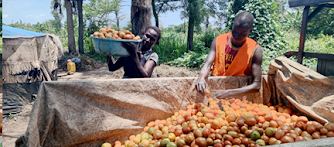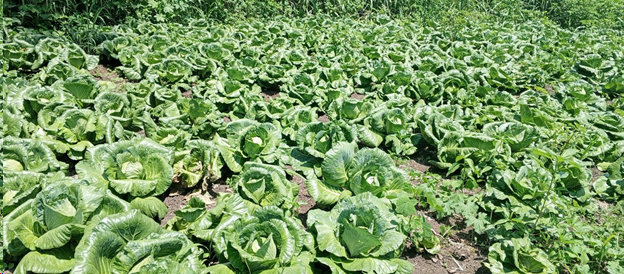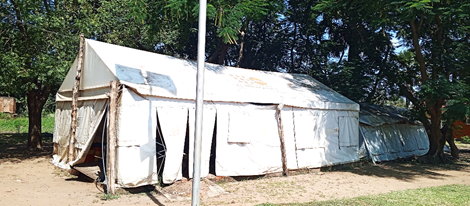Jambita group, empowered by DRDIP: dominates food markets in Obongi
Elizabeth Nyakouth (pseudonym), is a resilient 42-year-old South Sudanese refugee woman thriving in the heart of Palorinya settlement, in the West Nile - Obongi district.
 |
| Tomatoes ready for sale to retailers in Obongi |
Every morning, as dawn breaks, Nyakouth eagerly rises, her eyes fixed on the horizon of possibilities, a testament to her unwavering spirit and a glimpse into the promise of a brighter future. She hits the local market with fresh, attractive tomatoes and other green leafy vegetables including cabbages which she grows behind her small grass-thatched hut.
“I am surviving and growing my savings because of knowledge gained through trainings and support of DRDIP”, she chats. “This is helping me to feed my children, pay their school fees and contribute to weekly group savings”, Nyakouth confesses flamboyantly.“We are doing well I can say, especially, we the women in our group”, she adds.
 |
| Cabbage garden belonging to Jambita group |
Nyakouth is now able to rent one acre of land every year on her own to do her small scale crop agriculture. Apart from dealing in vegetables, the mother of four also grows cereals like maize which she stocks to feed her family and sell some to address other family essentials.
“This year, I have already saved Shs2,000,000
from these tomatoes you are admiring, I am sure by next year I will have a bigger
farm also for maize”.
Nyakouth is a proud member of a thriving community initiative known as the Jambita Vegetable Growing group that has taken root in Obongi district. Comprising 12 (eight men, four women) members, this group started in 2022 with a shared vision of cultivating vegetables to improve livelihoods and define a better future for the immigrant population.
Their journey was fueled by the support of the Office of the Prime Minister’s World Bank funded, Development Response to Displacement Impacts Project (DRDIP), the Livelihoods support-component.
 |
| Jambita members dominate markets |
Antonio Wara, the group's secretary revealed that Jambita received a grant of Shs18,500,000 from DRDIP to initiate the sub project. With strategic planning, the group invested this sum to purchase essential farming inputs: water pumps, gum boots, hoes, and high-quality seeds, totaling Shs11 million. The remaining funds went into securing two acres of land in Kochi Boma village, within the fairly productive Itula Sub County.
The group started off with erecting
seedbeds for tomatoes, sukumawiki, and cabbages. They planted 50% of the
seedlings that popped up, and sold 50% to local farmers, - starting off their
coveted journey of reaping even before the harvest of their own vegetables.
Cecilia Robu 40, a mother of three who
resides at zone III west village, another member of the group testifies how the
cash for works under the initiative helped her pay school fees for children.
“From my daily savings, even before we
started selling our products, I was able to buy books, pens and pencils for my
children and to buy for them food”, she said.
With DRDIP support, Jambita group
members received trainings on vegetable growing, financial management and
marketing with guidance of the Obongi District Agricultural Department.
“The skills gained after the training
has enabled me start up my backyard garden which is the cheapest source of
meals for my family”, Robu confessed.
Jambita group is today the chief supplier
of vegetables to Belameling and Morobi markets in Obongi district. This has improved the group’s access to money
through sale of the proceeds.
In December 2023 alone, the group netted
Shs10 million from tomato sales. They expected to get up to Ush15 million by
end of the harvest season in February 2024, but Wara says, “we are now seeing
that our expected earning might double because the market is good and our
garden is still green”.
A box of tomatoes is sold at Shs300,000
to retailers who come from different parts of Obongi, Yumbe and Koboko
districts. On the day of our visit, two large scale buyers had just paid off
for all the harvested tomoatoes. “Our group members are on their way to harvest
more, and more money is expected from other vegetables especially cabbages and
Sukuma”, Wara said.
Group members benefited from the cash
for work facilitation during the land clearance and digging session. Each
member received Shs150,000 at the end of the work and it enabled them sustain
household needs as they supplied labour to support the group project.
In the face of hardship, Jambita group has
demonstrated resilience and prudence. While food ratios from UN agencies keep
decreasing across refugee settlements, this group has ensured that their
families do not go to bed hungry. The vegetables harvested from the group
garden not only supplement their diet but also contribute to a healthier
lifestyle.
Looking ahead, Jambita group is not
resting on its achievements. They plan to acquire a tri-cycle for efficient
transportation of produce and expanding their farm to at least four acres in
the next season. With determination, hard work, and a shared commitment to
success, the members of this group are turning their refugee settlement into a food
basket for Obongi district.


Comments
Post a Comment